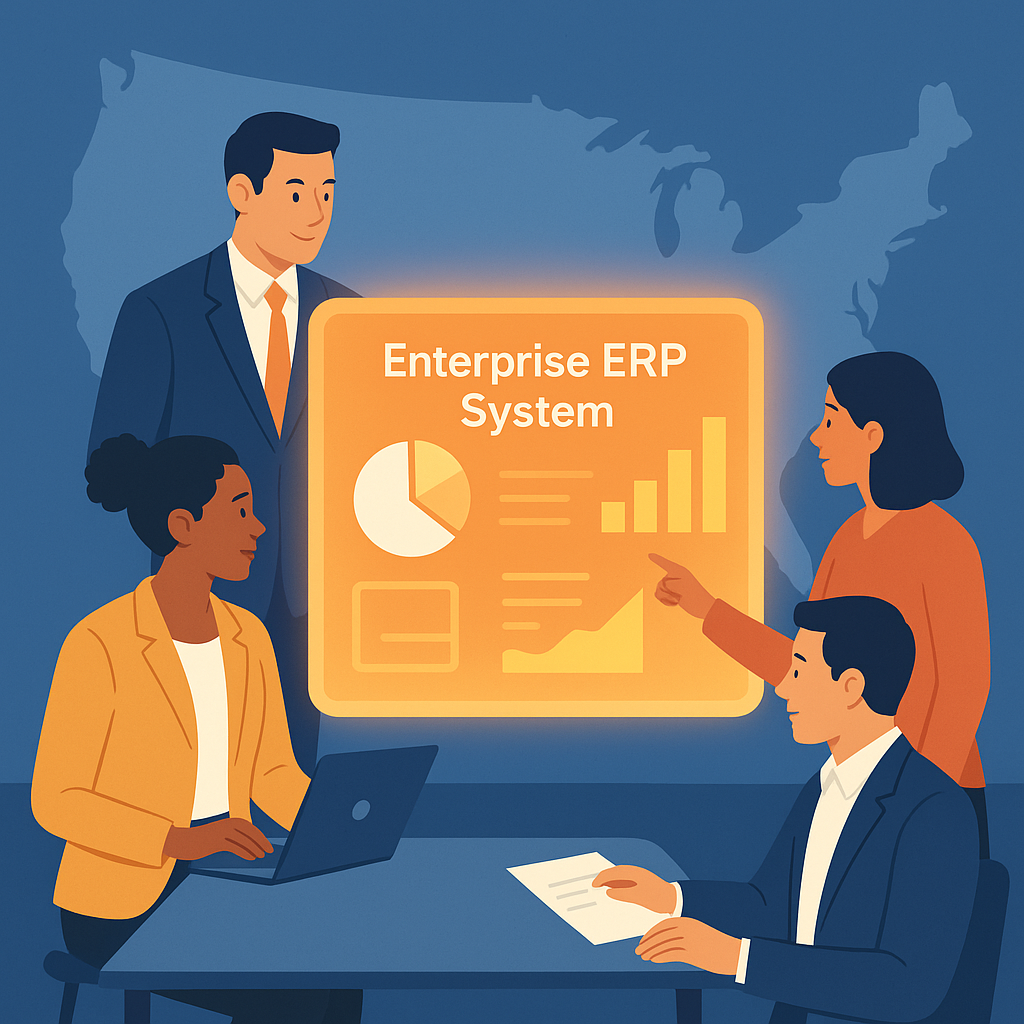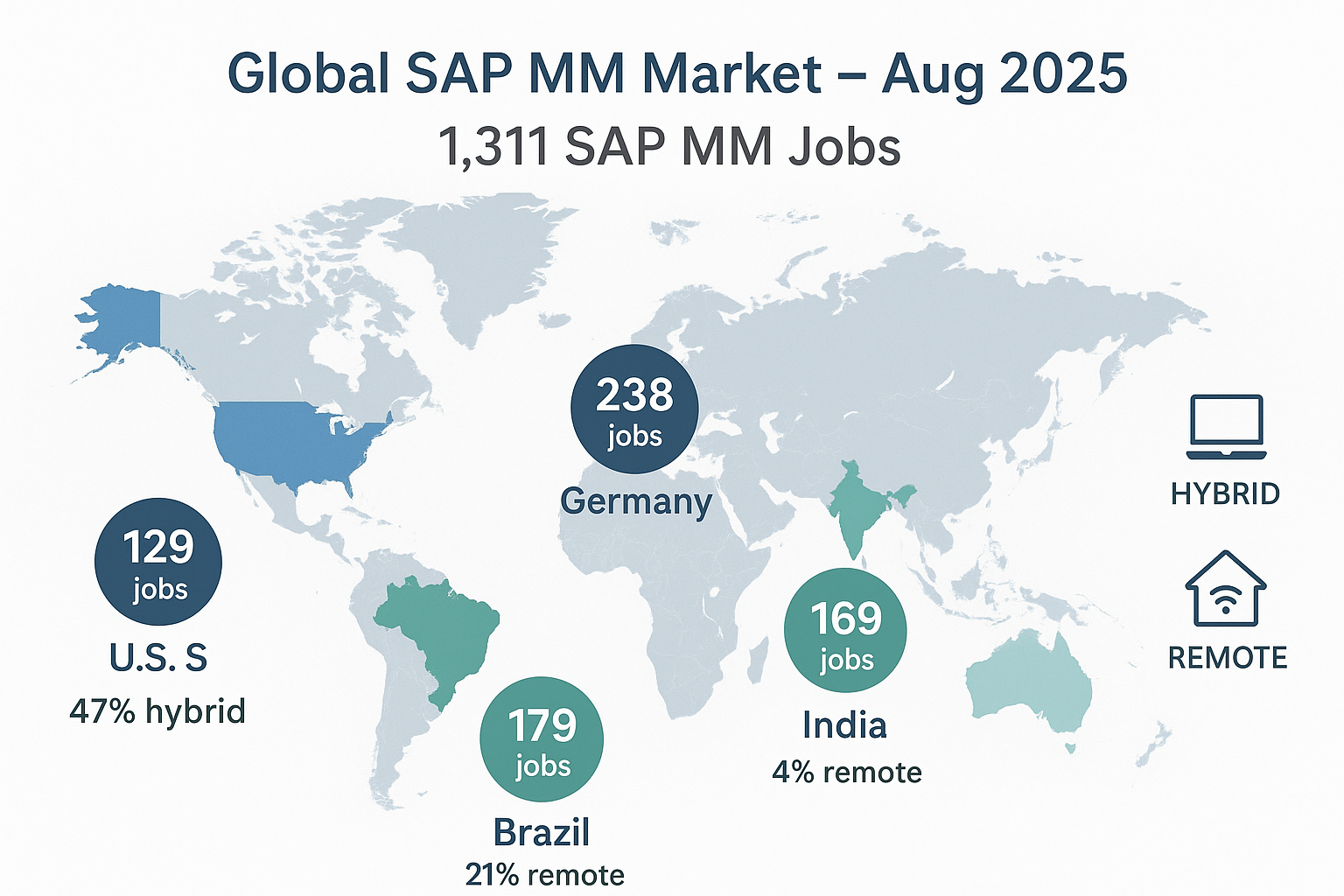How SAP Skills Transform Career Opportunities in the U.S. Job Market
How SAP Skills Transform Career Opportunities in the US Job Market
Why expertise in SAP systems commands premium salaries and opens doors across industries
The Power of SAP Skills in Today’s Business Landscape
In a digital-driven economy where enterprise solutions shape corporate strategy, SAP expertise has emerged as one of the most valuable professional assets in the American job market. Far from being merely another technical certification, SAP proficiency represents a gateway to career opportunities that span industries, functions, and pay grades.
SAP—Systems, Applications, and Products in data processing—serves as the operational backbone for most large enterprises worldwide. This widespread adoption has created a fascinating market dynamic: a persistent shortage of qualified professionals against a backdrop of ever-increasing demand. For job seekers and career planners, this imbalance creates a compelling opportunity.
The Business Impact
SAP’s dominance in enterprise software isn’t just a technical story—it’s a business revolution that touches nearly every aspect of modern commerce. When you purchase products from major retailers, track shipments, process insurance claims, or even when your doctor updates your medical records, these transactions likely flow through SAP systems. This ubiquity creates extraordinary value for professionals who can navigate and optimize these complex environments.
Let’s explore why adding SAP to your professional toolkit might be one of the most strategic career decisions you can make in the US job market, supported by industry data and insights from leading market analysts.
SAP’s Massive Footprint: Verified Market Data
Discover the impressive scale of SAP’s presence across global industries and why this creates sustained demand for skilled professionals.
Global Dominance
SAP serves 99 of the 100 largest global companies, showcasing near-ubiquity among the world’s biggest enterprises
Customer Base
SAP has over 440,000 customers across more than 180 countries worldwide
US Market Penetration
Percentage of Fortune 500 companies in the US that use SAP for critical business processes
SAP’s dominance in the enterprise software market creates significant ripple effects throughout the job market. With approximately 80-90% of Fortune 500 companies in the US using SAP for their critical business processes, the demand for skilled SAP professionals remains consistently high. This widespread adoption across America’s largest corporations establishes SAP as the backbone of enterprise operations in virtually every major industry.
Market Leadership
With approximately 23% global ERP market share, SAP stands as the largest enterprise resource planning software provider worldwide. The US market is particularly significant, accounting for about 45% of SAP’s global ERP customer base. Leading US companies like Amazon, Walmart, Apple, JPMorgan Chase, and Coca-Cola rely on SAP systems for their core operations.
The ongoing transition to SAP’s next-generation ERP system, SAP S/4HANA, is particularly significant in driving job demand. According to industry analysts at Whitehall Resources, this migration represents one of the largest enterprise software transitions in history, creating sustained demand for SAP professionals that will extend well into the decade.
This widespread adoption means that professionals with SAP skills enjoy a notable advantage: their expertise is both widely applicable across industries and deeply valuable within specific organizational contexts. SAP’s global workforce of approximately 109,000 employees and network of 26,900 partner companies further underscores the scale of the ecosystem that SAP professionals can leverage for career advancement.
US SAP Job Market: High Demand Across Multiple Roles
Explore the diverse career opportunities available in the SAP ecosystem across various functional domains and experience levels.
The US SAP job market remains robust and diverse, offering opportunities across multiple functional areas and experience levels. The SAP ecosystem has expanded far beyond its original focus on financial systems, creating pathways for professionals from various backgrounds.
In-Demand SAP Roles in 2025
- SAP FICO Consultants
- S/4HANA Finance Specialists
- Financial Planning Analysts
- Finance Transformation Leads
- Treasury Management Experts
- SAP IBP Consultants
- S/4HANA Logistics Specialists
- Demand Planning Analysts
- Inventory Optimization Experts
- Supply Chain Resilience Advisors
- SAP SuccessFactors Consultants
- HR Transformation Specialists
- Talent Management Experts
- Workforce Analytics Professionals
- Employee Experience Designers
According to Whitehall Resources’ 2025 SAP job market analysis, demand spans both full-time and contract roles, with particularly strong growth in specialized functions such as procurement (SAP Ariba) and customer experience (SAP CX/C4HANA). This diversity provides professionals with multiple entry points into the SAP ecosystem based on their existing skills and interests.
SAP Job Distribution by Location
Jobted data reveals that SAP opportunities are particularly concentrated in major US tech and business hubs. New York, Austin, Atlanta, Houston, Dallas, and Chicago stand out as primary markets for SAP talent, though opportunities exist nationwide as companies of all sizes implement these systems.
The technical side of SAP implementation also offers abundant opportunities, with roles such as ABAP Developers, Fiori UI/UX Specialists, and SAP Basis Administrators commanding premium salaries. The integration of emerging technologies such as AI, machine learning, and cloud computing with SAP’s ecosystem further expands the career possibilities for technically-minded professionals.
Key Challenges in the 2025 SAP Job Market
Understanding the market challenges helps professionals position themselves strategically for maximum career advantage.
While opportunities in the SAP ecosystem are abundant, Whitehall Resources’ 2025 SAP Salary Guide identifies several critical challenges shaping the job market landscape. Understanding these challenges is essential for both employers seeking to build SAP teams and professionals looking to position themselves strategically.
Talent Shortage
As more companies adopt SAP S/4HANA and cloud technologies, the scarcity of experienced professionals continues to grow, creating competitive hiring conditions.
Specialized Skills Gap
Niche expertise, particularly in AI and cloud integration within SAP environments, is increasingly difficult to find despite rising demand.
Global Competition
Remote work has widened the talent pool but intensified competition for top SAP professionals across international boundaries.
The dynamics of this market create both opportunities and challenges. For professionals, the skills gap represents a chance to develop highly marketable expertise. For organizations, creative recruitment and retention strategies become increasingly important.
Economic Impacts
According to Whitehall Resources, the shortage of skilled SAP professionals is driving salaries higher, especially for those with in-demand certifications. Meanwhile, the pace of technological change means continuous learning has become essential for both employers and candidates to remain competitive in this rapidly evolving landscape.
Premium Compensation: Salary Insights for SAP Professionals
Explore the financial benefits of SAP expertise and how it translates to premium compensation across different roles and experience levels.
Perhaps the most compelling aspect of SAP expertise is its direct impact on earning potential. Market data from Jobted indicates that SAP professionals in the US enjoy salaries higher than the national average, reflecting both the specialized nature of their skills and the business-critical importance of their work.
US Salary Ranges by SAP Role (2025 Data)
Entry-Level SAP
Average annual salary for Entry Level SAP Consultants with less than 3 years experience
Mid-Career SAP
Average for roles with 4-9 years of specialized experience
Senior SAP Experts
Average for professionals with 10-20 years experience, with late career experts earning $124,680+
These figures are supported by data from Jobted’s comprehensive salary analysis. According to Jobted, the average SAP Consultant salary represents a premium over comparable roles without SAP specialization. Entry-level positions start around $55,240, while experienced professionals can earn well over $136,420 annually.
Specific SAP specializations can command higher premiums. According to Jobted’s comparative data, Senior SAP Consultants, SAP Principal Consultants, and SAP Business Intelligence Consultants typically earn above the average SAP salary. Even within the SAP ecosystem, specialized knowledge creates additional value.
H1B Visa Salary Data for SAP America Inc.
H1B visa data provides valuable insights into SAP salaries. The H1B is a specialized work visa that allows US companies to employ foreign workers in specialty occupations requiring technical expertise. Because companies must demonstrate they’re paying market rates or better for these positions, H1B salary data is often considered a reliable indicator of competitive compensation.
SAP America Inc. 2025 H1B Salary Analysis
Recent H1B visa data for SAP America Inc. reveals impressive compensation levels across different experience grades:
| Experience Level | LCA Count | Minimum | Average | Median | Maximum |
|---|---|---|---|---|---|
| Level IV (Fully Competent) | 48 | $120,000 | $169,416 | $165,912 | $221,400 |
| Level II (Qualified) | 1 | $126,000 | $126,000 | $126,000 | $126,000 |
| Non-OES Wage | 9 | $104,819 | $135,618 | $129,566 | $217,903 |
| All Levels (2025) | 58 | $104,819 | $163,423 | $164,000 | $221,400 |
Wage Level Explanation:
- Level IV: Fully competent wage level for professionals with extensive experience, often in management or supervisory roles requiring independent judgment and evaluation.
- Level II: Qualified wage level for professionals with sufficient education or experience to perform the job competently.
- Non-OES Wage: Salaries based on independent surveys rather than the standard Occupational Employment Statistics wage levels.
This data demonstrates the premium value placed on SAP expertise, with the median salary for SAP America employees on H1B visas reaching $164,000 in 2025. Most notably, the data shows that 75% of all SAP America Inc. H1B visa holders earn below $175,000, while the top 10% earn above $201,690—showcasing the exceptional earning potential for senior SAP specialists.
The salary distribution at SAP America Inc. reflects the broader market trend of rewarding specialized SAP expertise. Even in entry-level positions, SAP professionals typically start at compensation levels significantly above the national average for comparable roles without SAP specialization.
Beyond base salary, SAP professionals often enjoy additional benefits that reflect their strategic importance: performance bonuses tied to successful implementations, flexible work arrangements, international assignment opportunities, and advanced training programs that further enhance their market value.
Career Paths: From Functional Expert to Strategic Leader
Discover how SAP expertise can evolve into diverse career pathways that extend beyond traditional IT boundaries.
One of the most valuable aspects of SAP expertise is its ability to create career pathways that extend beyond traditional IT boundaries. As SAP touches virtually every aspect of business operations, professionals can evolve their careers in multiple directions based on their interests and strengths.
Common Career Progression Routes
Career Progression Pathways
- Functional to Cross-Functional: Many professionals start in a specific module (Finance, HR, Supply Chain) before expanding their expertise across multiple SAP domains.
- Implementation to Strategy: Moving from hands-on configuration work to solution architecture and strategic advisory roles represents a common advancement path.
- Technical to Management: SAP consultants and analysts often progress into project management and technical leadership positions, leveraging their expertise in both technology and business processes.
- Internal to Consulting: Transitioning from an internal SAP role to consulting offers increased variety and typically higher compensation.
- Business to IT Leadership: SAP professionals who develop both technical expertise and business acumen significantly increase their chances of being considered for executive IT roles—such as CIO, CTO, or digital transformation leader.
The connection between SAP skills and business processes makes these professionals uniquely positioned to bridge the traditional gap between IT and operations. This ability to “speak both languages” creates opportunities to move into strategic leadership roles that oversee entire business transformations.
Career Progression Pattern
Many SAP professionals report that cross-module knowledge accelerates career advancement. Starting with functional expertise in areas like FICO, MM, or HR and then expanding to understand integration points often leads to roles in solution architecture and ultimately enterprise architecture. This broad systems understanding is particularly valuable for professionals who go on to lead digital transformation initiatives.
According to industry analysis, professionals with SAP expertise often advance to director-level positions more quickly compared to peers with similar experience in other technical domains. This accelerated progression reflects their deeper understanding of enterprise-wide processes and the critical nature of the systems they manage.
Gender Distribution in SAP Roles
Jobted data reveals an opportunity for greater gender diversity in the SAP field. Currently, approximately 73% of SAP Consultants are male, while 27% are female. This imbalance represents both a challenge and an opportunity for organizations looking to build more diverse technical teams.
Getting Started: Building Your SAP Career Foundation
Practical steps to launch your career in the SAP ecosystem and position yourself for success.
For professionals considering developing SAP expertise, there are multiple entry points based on existing skills and career goals. While the learning curve can be steep, the return on investment in terms of career opportunities and compensation makes SAP skills development a compelling proposition.
Key Steps for Entering the SAP Ecosystem
Identify Your Path
The most successful approach is to align your SAP focus with your existing domain expertise. For example, finance professionals should explore SAP FICO, HR specialists should target SuccessFactors, and those with supply chain experience should focus on SAP’s logistics modules. This targeted approach allows you to leverage your business knowledge while learning the technical aspects of SAP.
Structured Learning
Industry experts recommend systematic knowledge building rather than attempting to learn everything at once. Start with foundational concepts in your chosen module, then gradually expand to understand integration points with other areas. Leverage free resources like SAP Learning Hub, community forums, and introductory courses to build this foundation incrementally.
To kickstart your SAP journey, explore the wealth of free resources available on the SAP Learning Hub and on YouTube. These platforms offer a variety of onboarding resources, including videos, webcasts, and community forums, designed to help you build foundational knowledge and connect with other learners.
Certification
As organizations accelerate their digital transformation initiatives, certified SAP professionals are increasingly in demand. Certification serves as tangible validation of your technical knowledge and demonstrates commitment to professional development. In today’s competitive job market, these credentials can significantly enhance your marketability.
The most successful SAP professionals combine technical aptitude with business acumen. Understanding both the technology and its real-world business application is what separates average practitioners from highly sought-after experts who can drive meaningful transformation.
Entry Strategy for Technical Professionals
For those coming from a general IT background, the transition path looks slightly different. Database administrators might focus on SAP Basis or HANA administration, software developers on ABAP or Fiori development, and network specialists on SAP infrastructure. The key principle remains the same: build on your strengths and expand methodically rather than attempting to master the entire SAP ecosystem simultaneously.
The S/4HANA Opportunity
The ongoing global migration to SAP S/4HANA represents a particularly strategic entry point for professionals looking to develop SAP expertise. This transition involves fundamental changes to how businesses operate, creating demand for talent that understands both legacy systems and next-generation capabilities. Focusing your learning on S/4HANA-specific skills can provide an accelerated path to high-demand roles.
Frequently Asked Questions
Expert answers to common questions about building a career in the SAP ecosystem.
No, a technical background is not strictly necessary to build a successful SAP career. While technical roles like ABAP Development or Basis Administration do require programming knowledge, many SAP career paths are open to professionals from non-technical backgrounds. Functional consultants often come from business domains like finance, human resources, or supply chain management.
The most important qualities are analytical thinking, problem-solving skills, and a willingness to learn complex business processes. Many successful SAP professionals started with business expertise and gradually developed the technical knowledge needed to implement and configure SAP solutions.
As of 2025, SAP S/4HANA certifications generally offer the strongest return on investment due to the ongoing global migration to this platform. Specifically, S/4HANA Cloud certifications are particularly valuable as more organizations move toward cloud-based implementations.
For those interested in specialized areas, certifications in SAP IBP (Integrated Business Planning), SAP Ariba (procurement), and SAP Analytics Cloud also command premium compensation due to market demand. The ideal certification path depends on your background and career goals—finance professionals might focus on S/4HANA Finance, while supply chain experts could pursue S/4HANA Supply Chain Management certifications. Remember that certification value is maximized when combined with practical experience.
Remote work has significantly transformed the SAP job market in several ways. On the positive side, geographic barriers have diminished, allowing professionals to access opportunities beyond their local markets. Many SAP consultants now work with clients across the country or internationally without relocation. Companies have also expanded their talent searches nationwide, creating more opportunities for qualified candidates regardless of location.
However, this has also increased competition, as SAP professionals now compete in a broader talent pool. Additionally, certain implementation phases still benefit from on-site presence, creating a hybrid model where consultants may travel periodically for critical project milestones while handling day-to-day work remotely. Overall, remote work has expanded opportunities while placing greater emphasis on communication skills and self-management abilities.
References
- Whitehall Resources. (2025). “SAP Salary Guide 2025.” whitehallresources.com
- Jobted. (2025). “SAP Consultant Salary Data.” jobted.com
- H1BGrader. (2025). “H1B Sponsors: SAP America Inc. Salaries.” h1bgrader.com
- SAP SE. (2025). “About SAP: Company Information.” sap.com
- HL. (2024). “SAP Industry Overview.” hl.com
- ReadyContacts. (2024). “Fortune 500 Companies That Use SAP.” readycontacts.com
- Data Marketers Group. (2024). “How Many Fortune 500 Companies Use SAP.” datamarketersgroup.com
Share this content:



Post Comment